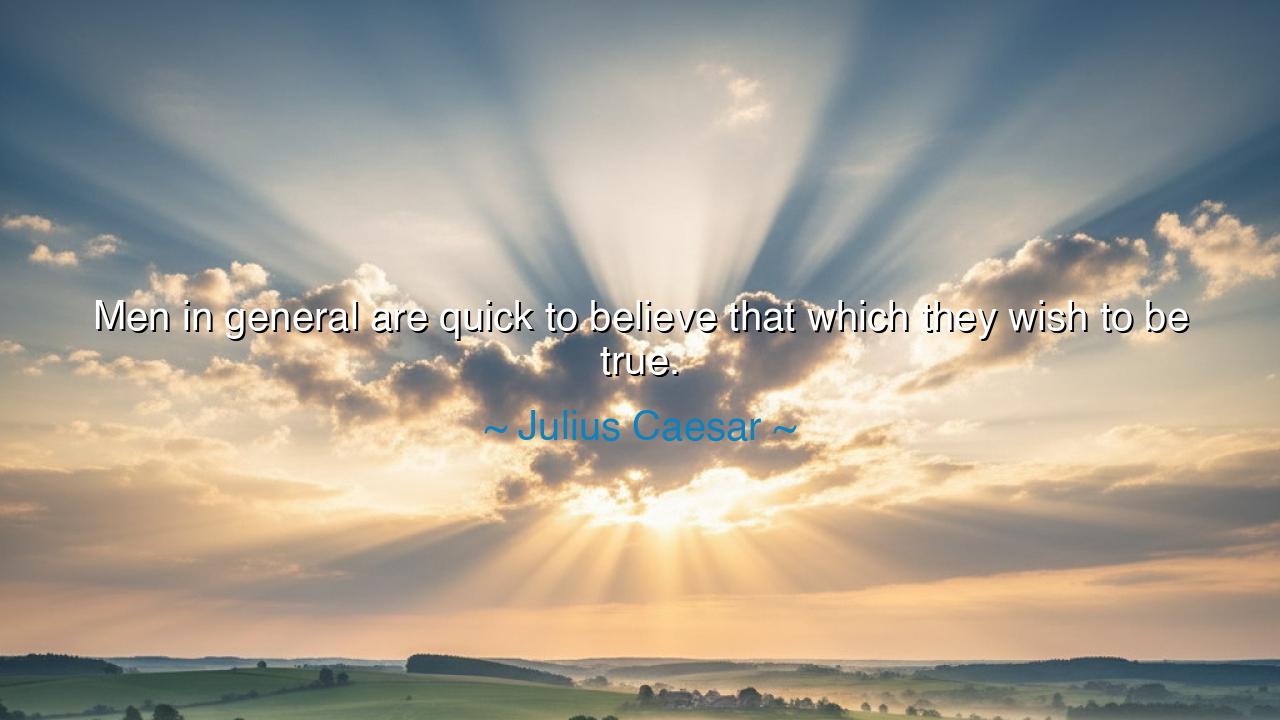
Men in general are quick to believe that which they wish to be






Hear now the words of Gaius Julius Caesar, conqueror of Gaul and master of Rome, who spoke with piercing clarity: “Men in general are quick to believe that which they wish to be true.” This saying is both warning and revelation. It unmasks the frailty of the human heart, which so often prefers the comfort of illusion over the harshness of reality. Caesar, who rose through ambition and cunning, understood that the greatest empire is not built only on swords and legions, but upon the beliefs and desires of men.
The origin of this quote lies in Caesar’s reflections on human nature, recorded in his Commentaries. As a commander, he knew that soldiers fight with greater zeal when they believe victory is certain, even if the odds are grim. As a politician, he saw how citizens were easily swayed by promises that flattered their hopes. To him, belief was not always born of truth, but of desire. Men believe quickly what they wish to be true, because the heart is impatient and the mind eager to justify what it longs for.
History bears witness to this truth. Consider the tale of the Trojan Horse. The Trojans, weary from years of siege, wished desperately for the war to be over. When they saw the wooden horse, they believed—too quickly—that it was a gift of surrender, a token of peace from their enemies. Their desire for rest and triumph blinded them, and in welcoming the horse, they welcomed their destruction. Caesar’s words live in this story: it is often our wishes, not reality, that shape what we choose to believe.
In more recent times, reflect on the rise of financial bubbles. In the early 2000s, investors believed that housing prices would only climb higher, forever and without end. This was not reason but desire, not truth but wish. They believed what they longed for: endless wealth, unshakable security. When the illusion broke, economies fell into ruin. Caesar’s insight is eternal: when men let desire shape their belief, disaster waits at the door.
Yet there is also a deeper layer of wisdom here. To recognize this weakness is to arm oneself against it. The wise man examines not only what he believes, but why he believes it. Is it born of evidence, or merely of hope? To test one’s belief against truth, even when painful, is the path of strength. But to surrender belief to desire is to walk willingly into chains of delusion. Caesar warns us not to be slaves to what we wish, but masters of what is real.
The emotional power of this saying lies in its call to vigilance. For desire is sweet, and illusions are comforting. It is easy to trust the voice that tells us what we want to hear. But wisdom demands discipline—the courage to doubt, the humility to question, the strength to seek truth even when it wounds. Only thus can a man rise above the common fate and walk the path of the truly free.
The lesson for us is clear: in life, do not rush to believe merely what pleases your heart. Examine, weigh, and test. Be wary of leaders who promise only what you long to hear, for such men exploit the weakness Caesar described. Instead, cling to truth, however hard, for it is the only foundation that endures. Train yourself to pause before accepting a pleasing story, and ask: Do I believe this because it is true, or because I wish it to be so? In this discipline lies the difference between wisdom and folly, between survival and ruin.






AAdministratorAdministrator
Welcome, honored guests. Please leave a comment, we will respond soon